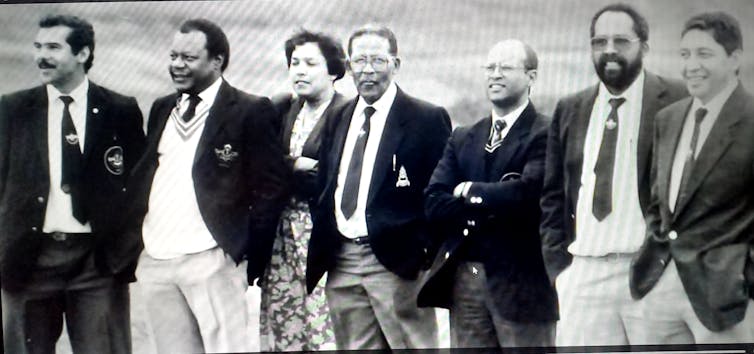
The South African Council on Sport at 50: the fight for sports development is still relevant today
It’s 50 years since the official formation of the South African Council on Sport (Sacos). Sacos was the sport wing of the anti-apartheid liberation movement. It was established in 1973 and disbanded in 2005. It’s main aim, at the time, was to lay the ground for all national sport federations to be able to compete […]

It’s 50 years since the official formation of the South African Council on Sport (Sacos). Sacos was the sport wing of the anti-apartheid liberation movement. It was established in 1973 and disbanded in 2005. It’s main aim, at the time, was to lay the ground for all national sport federations to be able to compete in international competition – and not just the teams of the white-minority apartheid state.
As a remembrance campaign, regional committees were established in various South African cities to commemorate this nearly forgotten but historically important organisation. It’s important to remember Sacos because its ideals of a non-racial sport society have still not been realised in 2023.
Instead, South African sport has regressed to elitism, uncontrollable corruption, over-professionalism, nepotism and exclusion.
The Remembering Sacos Campaign, begun on 17 March 2023, consists of seminars, exhibitions and sport activities. It is an ongoing drive, aiming to make the majority of South Africans aware of their present-day marginalisation from sports structures. Simply put, it is a reactivation of the Sacos slogan:
No normal sport in an abnormal society.
The slogan meant that sport cannot be divorced from broader social issues. It was a very unpopular idea among establishment sport circles in the 1970s, who spread a message that sport and politics do not mix.
Sports historians have contributed sparse but important research works that reveals the huge contribution Sacos made to sport development in South Africa up until 2005.
These histories, combined with information from archives at local and overseas universities, show how sport development was used to unite oppressed communities, unlike the false unity of today. Administrators were able to develop sport programmes from community to national level without government and corporate support. They were united around issues such as organising fixtures, agitating for facilities, seeking out sponsorships and others. This was enabled by self-sacrificing leaders, committed to non-racialism – such as 1980s Sacos leader Willie Adams.
The history of Sacos offers insights into how to craft new narratives that could advance sport development in marginalised communities today.
Remembering Willie Adams
Willie Adams (1951-2012) was the subject of one symposium marking the 50th anniversary. Adams personified what Sacos leadership represented during apartheid and what potential it holds for a future sport leadership.

This activist and intellectual sports leader realised the importance of a politically non-aligned resistance sports movement that worked towards an equal and open society. Even after the first steps to dismantle the country’s apartheid structures, Adams and a small band of former Sacos comrades remained true to this principle. They successfully waged a “Stop the Olympic bid committee” campaign in the 1990s. They argued that development must take precedence over hosting high-profile events, especially in a society struggling to recover from decades of oppression under white minority rule.
Adams also continuously warned of the pitfalls of a hastily concocted sport unification in the 1990s. He based his sport-political project firmly on Sacos principles of No Normal Sport in an Abnormal Society.
A history of Sacos
Sacos was established in 1973 by a small group of sports administrators, representing nine federations from oppressed communities. This was to formulate a response to the government’s apartheid practices, which promoted separate development for different racially classified communities.
In 1970, the apartheid government introduced a new multinational sport policy. It was an attempt to trick the international community into believing it was making significant reforms of its segregation practices. This was a time when South Africa was expelled from the International Olympic Committee and an increasing number of international sports federations. Absurd as it may seem today, the new policy allowed people from different, racially classified, communities to play sport together – provided they applied for a permit. But apartheid laws remained firmly intact.
Initiated by the non-racial South African Soccer Federation, a meeting was held under the name The First Conference of National Non-Racial Sports Organisations (commonly referred to as “the ad hoc committee”). It took place at the Himalaya Hotel in Durban on 6 September 1970. The committee had meagre funds at its disposal and no permanent administrative staff. Meetings were held after work hours in private offices.
The meeting may be regarded as the first step towards the formation of Sacos. It revolved around the presentation of two papers: Problems Confronting our Sports Administrators and Sportsmen of our Country by Morgan Naidoo and International Sport by M.N. Pather. These papers have unfortunately not been preserved but the minutes of the meeting indicate that discussions revolved around the lack of opportunity for oppressed communities to participate in international sport. These issues remain unresolved in a society with huge inequalities and rampant corruption.
After a series of formal meetings for the next three years, Sacos was established on 17 March 1973 at the Himalaya Hotel. Guest speakers included Mangosuthu Gatsha Buthelezi from the Inkhata Party and journalist Barry Streek representing the banned student leader, Paul Pretorius. Sacos was to prepare the ground for oppressed national sporting bodies to achieve international recognition. Apartheid sports federations ignored its overtures, resulting in a hardening of Sacos attitudes, especially after the Soweto 1976 uprising.
When Adams entered the Sacos leadership in the 1980s, the organisation had changed. It envisaged a new sporting world for South Africa’s oppressed masses, beyond just international participation. Again, the apartheid government rejected its call. As did the new, post-apartheid sports regime under the ruling African National Congress’s short-lived National Sports Congress. The Sacos call, this time, was for development first – before international participation. This lack of recognition by the state led to the eventual demise of Sacos in 2005.
For those in search of a new sports world of equal opportunity for all South Africans, it is worth remembering Sacos and its fight for sports development.![]()
Francois Cleophas, Senior Lecturer in Sports History, Stellenbosch University
This article is republished from The Conversation under a Creative Commons license. Read the original article.
